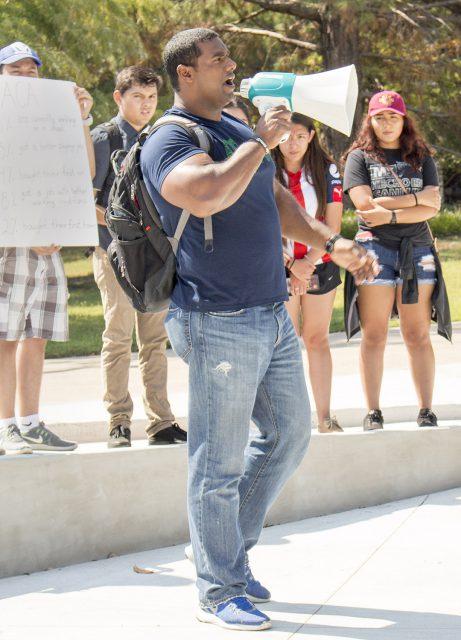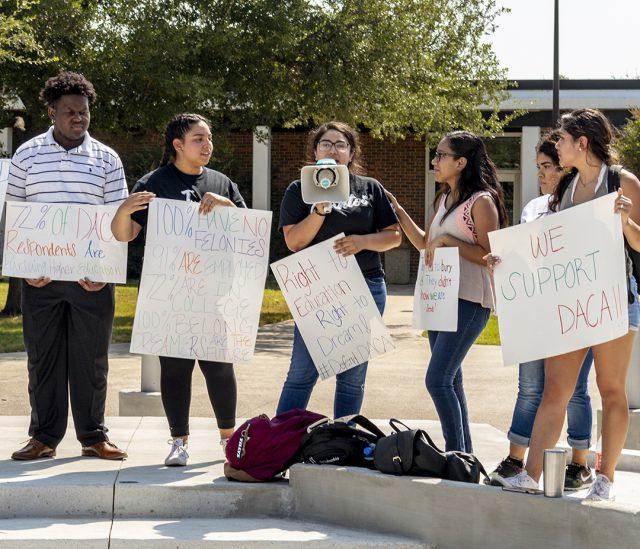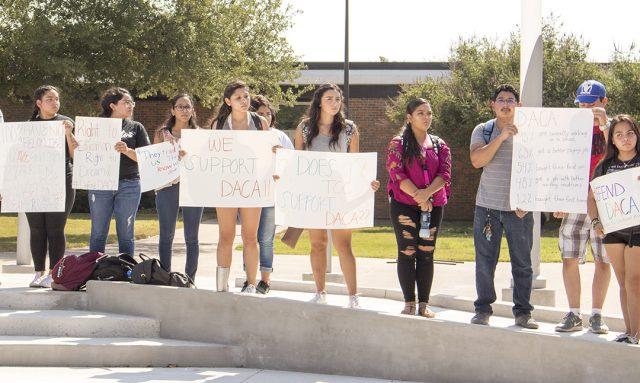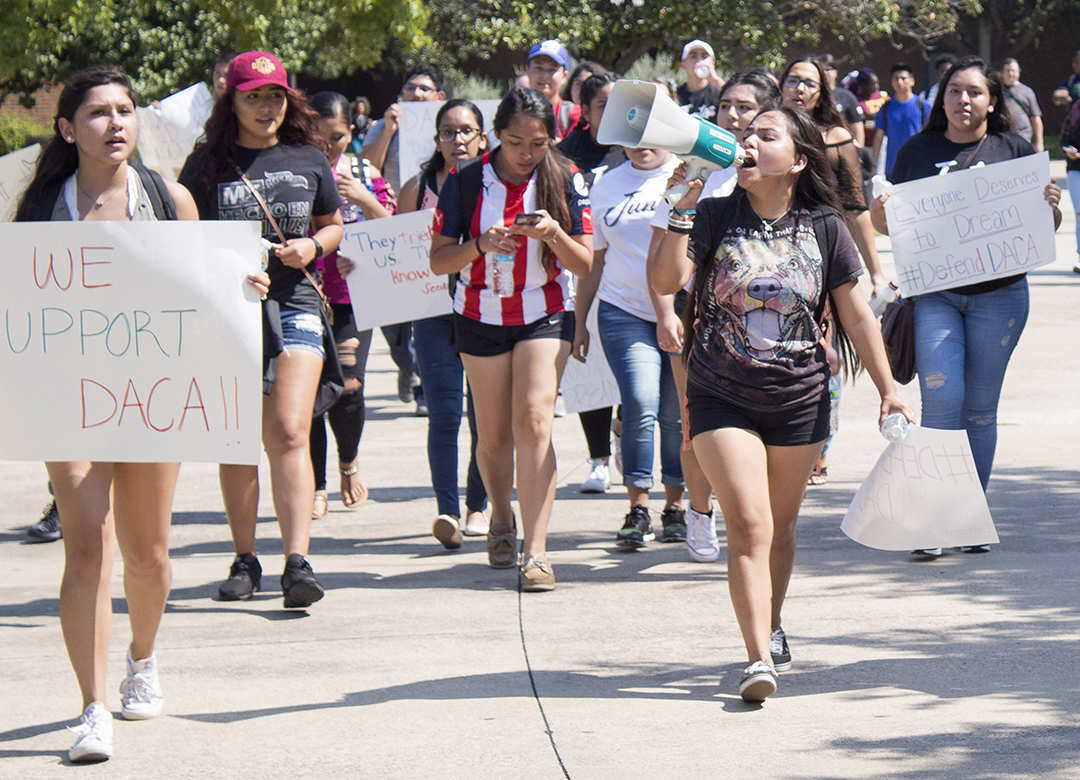By Kathryn Kelman/editor-in-chief
Citizenship issues still loom one year later despite support
A year ago, the Trump administration announced its decision to rescind the Deferred Action for Childhood Arrivals program spurring protests around the country and prompting a rally on South Campus as students sought support from the college.
Around the same time, South student Paloma Gutierrez was applying for the program herself, and with her future hanging in the balance, the campus’ Latin American Student Success Organization president was filled with anxiety.
“It made me think about my education like, ‘If I get my education, am I really going to get to go through with my career of my choice?’” she said. “Even with a regular job, honestly, if there wasn’t such an opportunity like DACA, I wouldn’t be able to have a good job.”
Despite the program still being on shaky ground following a roller-coaster year of court decisions keeping it alive, Gutierrez received her approval for DACA about two months ago. It’s opened her up to even more opportunities.
“Now I see how much it actually impacted my life,” she said. “It’s been crazy getting to feel this change and how much this has actually impacted me.”
The LASSO president and roughly 700,000 other young immigrants who came to the U.S. as children are currently protected from deportation through the program.

Collegian file photo
Gutierrez and 24 other TCC students rallied together Sept. 14, 2017, in an effort to get the college to acknowledge DACA recipients and the issues they faced.
“That was our main goal because we hadn’t heard from anybody from TCC besides my advisers or the people I’m in the programs with,” Gutierrez said. “Those are the people who have been extremely supportive. Anybody else, that wasn’t them, that works at TCC or is faculty, staff or whatever it might be, we didn’t hear anything from them.”
The college issued a statement in support of students and directing them to the different resources available to them around the campus, but it never referenced DACA or DACA recipient students.
Gutierrez came to the U.S. at the age of 5 with her sister and her mother, and a lot of obstacles came with that, she said.
“I believe DACA was what’s supposed to help us,” she said. “It’s a program that helps me be here in the U.S. legally. It gives me access to working here legally as well, having Social Security, having driver’s licenses, getting, you know, whatever it is that I need to have a good future ahead of me, which one of them being having an education.”
The idea for last year’s protest arose after Gutierrez spoke with a friend who attends the University of Texas at Arlington. Her friend told her about the statement UTA made in support of DACA students regarding the resources the college had available for them, she said.
“That’s whenever it kind of hit me like, ‘Do I really have my college’s support?’ And that’s what most of us were thinking of too, like ‘Does TCC support us?’” she said.
The rally got the attention of South’s president Peter Jordan who met with the 25 students to address their concerns.

Collegian file photo
“Dr. Jordan made us feel supported,” Gutierrez said, but added there’s still room for improvement as more support from faculty and staff would be appreciated.
The other goal for the students who rallied was to raise awareness and educate those in their TCC community.
During the protest, many students shared their opinions as well as their own personal struggles as DACA recipients or friends/family members. They also shared statistics about DACA, including the fact that 100 percent of the recipients have no criminal record.
“We wanted our community to hear us out ‘cause some people aren’t educated on DACA,” Gutierrez said.
It’s on DACA recipients to stand up and inform people about it to raise more awareness, Gutierrez said, but other issues impacting Latino students should also be talked about, which is why she decided to continue as LASSO’s president this fall.
The threat of deportation still looms over the heads of DACA recipients, said South intercultural student engagement coordinator Jonathan Perez.
“Nothing has changed in that sense,” he said, adding he recently had a student who received a letter indicating she wasn’t eligible to renew her DACA status despite being in the states since second grade.
She isn’t the only TCC student or student in the U.S. whose future is still uncertain. But, despite what’s happening with DACA federally, Perez noticed a new culture at TCC.
“I believe now people are very open and comfortable now to talk about it,” he said, adding that this stems from Chancellor Eugene Giovannini’s leadership. “The Chancellor is setting a great example of not just talking the talk but walking the walk.”

Collegian file photo
The new culture is more student-focused, according to Perez, as the college seems more committed to helping each TCC student regardless of their circumstances.
“That right there is more powerful because I remember this time last year it was a more fearful time for undocumented and DACA-recipient students,” he said.
The college has taken action in the last year to direct students to resources on their campuses as well as in the Tarrant County community, which Perez said is important.
“I think it’s important because a lot of times the community that is impacted by this law, this bill, the rhetoric that we have in our society right now has put a lot of them back in the shadows and made them afraid to come out and ask for help or afraid to come and ask for information, and who are we as educators to deny someone information?” Perez said.
In addition to this culture change, Perez would like to see an expansion of TCC’s Intercultural Network. He’d also like for him and his colleauges to receive more training for them to learn more about the community they serve and for other campuses to adopt NW’s citizenship pipeline program.
NW Campus will host a Citizenship Info-thon Sept. 22 to help people in the community find out if they are eligible to apply for citizenship, said NW special projects coordinator Lourdes Davenport.
“We will have about three experts here that day to do some kind of Q&A with the community because there are so many different factors that play into whether somebody is eligible to apply,” Davenport said.
One of TCC’s goals is to serve the community and the Info-thon and Mega Citizen workshop align with that goal, Davenport said. With many TCC students being DACA recipients and many more having family members who may be eligible to apply for citizenship but don’t out of fear of stepping forward, Davenport said events like this are part of her job.
“It’s my responsibility to reach out and do things like this and coordinate things like this so that we can be serving our community, both our campus community and community at large,” she said.
The event is from 10 a.m. to noon in WSTU 1303 and 1305 on NW Campus. For more information, contact Davenport at lourdes.davenport@tccd.edu or 817-515-7063.

